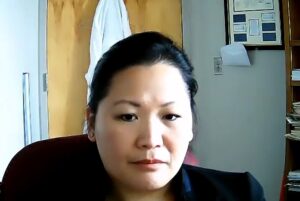Webinar Focuses on Asian Americans’ Experiences in South
| May 25, 2022 | The University of Arkansas for Medical Sciences (UAMS) Division of Diversity, Equity and Inclusion hosted a virtual event May 18 during which panelists shared their experiences growing up as Asian Americans in the South.
The panelists were Dora Smith, M.D., director of inpatient obstetric services and an associate professor in the College of Medicine Department of Obstetrics and Gynecology; Smit Patel, a freshman medical student at UAMS; and Joe Dan Yee, the mayor of Lake Village.
Ping-Ching Hsu, Ph.D., a tumor biologist and assistant professor in the Fay W. Boozman College of Public Health, served as one of the event’s moderators. She was born and raised in Taipei, Taiwan, and came to the United States at age 28. For her first question to the panelists, she asked: “Are we always foreigners?”
Smith, a native of Lake Village, said she’s often faced the question of “Where are you from?” She recalled being younger and not understanding the question.
“What do you mean, where am I from?” she remembered thinking. “I’m from Lake Village. I’m from Arkansas.”
Patel, who was born in India and moved to Brinkley when he was 14 years old, said that question made sense to him at first. But as he kept being asked to explain how he’s different, he decided to face the issue head-on. “Yes, I am from India, but I’m just as American as you are,” he said.
Yee said he didn’t have that experience, which he attributed to his growing up in Lake Village, a small community where everyone knew him. But he remembered a time when he was a child and his father took him to the dentist, where there was a room for white patients and a room for Black patients.
When he asked his father which room they’d go into, he was told that they’d enter the room for white patients. “I said, ‘Dad, we’re not white; we’re Chinese,” he recalled.
Responding to a viewer’s question about the challenges youths and young adults face today, Patel said that when he talks to members of any minority group, “the suffering is very similar.” He said he’s helped and been helped by fellow students who don’t share his heritage but who do have similar stories.
“I think just realizing that your struggles are not your own, and you’re not alone in this journey, it helps,” he said.
Smith emphasized the importance of respecting other people’s stories. “If you silo yourself, you feel like you’re being attacked,” she said. “But if you sit back and listen to other people’s stories, I think empathizing is much easier.”
One student asked Smith for advice about where to pursue a residency, citing a trend of Asian Americans going to urban areas with larger numbers of people who look like them. Smith feels that to be a good doctor, a person needs to be open to diversity.
“What makes us comfortable is to be around people like us,” Smith said. “What makes us grow sometimes is to be around others who are not like us.”
The event began with a video highlighting the important role that Chinese grocery store owners have had in the Mississippi Delta. During the era of racial segregation, those stores served African American customers, sometimes extending credit for those who struggled to pay for their groceries.
Sharanda Williams, the College of Medicine’s assistant dean for student affairs and diversity and the event’s other moderator, noted that Smith and Yee’s families
owned grocery stores in Lake Village. Yee said his family’s business was a reason the community supported him when he ran for mayor. He said he didn’t understand at first the store’s generosity toward people who didn’t have enough money, and he told his father, “Dad, they didn’t pay.” His father said, “Son, it will come back to you in life.”
To watch a recording of the webinar, click here.

